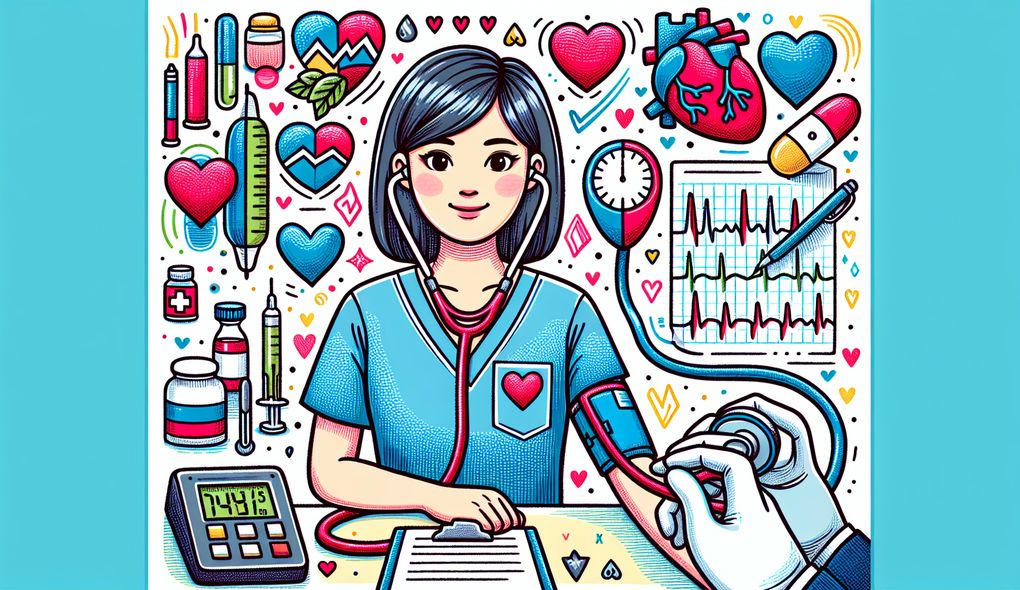Do you currently hold Basic Life Support (BLS) and Advanced Cardiac Life Support (ACLS) certifications?
SENIOR LEVEL

Sample answer to the question:
Yes, I currently hold Basic Life Support (BLS) and Advanced Cardiac Life Support (ACLS) certifications. I believe these certifications are essential for providing high-quality care to patients with cardiovascular diseases. With BLS and ACLS training, I am equipped with the skills and knowledge to respond effectively to cardiac emergencies and provide life-saving interventions. These certifications have helped me develop advanced clinical skills in cardiology care and have shaped my strong diagnostic reasoning abilities. Additionally, they have also given me the confidence to work collaboratively in a multidisciplinary team and communicate effectively with patients and their families.
Here is a more solid answer:
Yes, I currently hold Basic Life Support (BLS) and Advanced Cardiac Life Support (ACLS) certifications. These certifications have been instrumental in my ability to provide advanced cardiology care to patients. Through BLS training, I have acquired the necessary skills to respond to cardiac emergencies, including performing CPR, using an AED, and managing obstructed airways. ACLS certification, on the other hand, has enabled me to further optimize patient outcomes through the proper administration of medications, advanced airway management, and effective team coordination during resuscitation efforts. These certifications have significantly contributed to the development of my clinical skills, particularly in interpreting and analyzing cardiovascular diagnostic tests such as EKGs, echocardiograms, and stress tests. By continuously updating my knowledge of current cardiovascular pharmacology, I ensure that the medications I prescribe are evidence-based and tailored to the individual needs of my patients. Furthermore, these certifications have enhanced my communication and interpersonal skills, enabling me to effectively educate patients and their families about cardiovascular disease management and prevention strategies. In a multidisciplinary team, I have learned to collaborate seamlessly with cardiologists, nurses, and other healthcare professionals to develop comprehensive treatment plans and provide patient-centered care. Overall, my BLS and ACLS certifications have been instrumental in my ability to deliver high-quality care that meets the needs of patients with cardiovascular diseases.
Why is this a more solid answer?
The solid answer provides more specific details about the impact of BLS and ACLS certifications on the candidate's clinical skills, diagnostic reasoning, communication, and collaboration abilities. It emphasizes the practical skills acquired through BLS certification and the advanced knowledge and coordination skills gained through ACLS certification. Furthermore, it highlights the candidate's continuous learning and commitment to evidence-based practice in cardiovascular care. However, more specific examples and the candidate's personal experiences related to BLS and ACLS certifications could further strengthen the answer.
An example of a exceptional answer:
Yes, I currently hold Basic Life Support (BLS) and Advanced Cardiac Life Support (ACLS) certifications, and these certifications have been instrumental in my ability to provide comprehensive care to patients with cardiovascular diseases. With BLS training, I have developed proficiency in performing high-quality CPR, managing obstructed airways, and using an AED to restore normal cardiac rhythm during emergencies. Additionally, BLS certification has equipped me with valuable skills in recognizing signs of cardiopulmonary arrest, initiating appropriate resuscitation measures, and effectively communicating with the rest of the team to ensure swift and coordinated responses. Through ACLS certification, I have gained advanced knowledge in cardiac pharmacology, enabling me to prescribe and administer medications with precision to optimize patient outcomes. ACLS training has also honed my ability to interpret and analyze complex cardiovascular diagnostic tests, such as EKGs, echocardiograms, and stress tests, allowing me to make accurate diagnoses and develop targeted treatment plans. These certifications have not only enhanced my technical skills but also greatly contributed to my communication and interpersonal abilities. By effectively educating patients and their families about their cardiac conditions, treatment options, and lifestyle modifications, I empower them to actively participate in their own care and make informed decisions. Collaboration in a multidisciplinary team is essential in cardiovascular care, and my certifications have prepared me to work seamlessly with cardiologists, nurses, and other healthcare professionals. By engaging in open and collaborative communication, I ensure that the treatment plans are comprehensive, evidence-based, and tailored to the individual needs of each patient. Ultimately, my BLS and ACLS certifications, along with my extensive clinical experience, have shaped me into a highly skilled and competent Cardiovascular Nurse Practitioner who is well-equipped to provide exceptional care to patients with cardiovascular diseases.
Why is this an exceptional answer?
The exceptional answer expands on the solid answer by providing more specific details and examples of how the candidate's BLS and ACLS certifications have contributed to their comprehensive care for patients with cardiovascular diseases. It highlights the candidate's technical skills in CPR, airway management, and defibrillation acquired through BLS certification, as well as their knowledge in cardiac pharmacology and diagnostic interpretation gained through ACLS certification. The answer also emphasizes the candidate's effective communication and collaboration abilities, as well as their patient-centric approach to education and shared decision-making. Additionally, it showcases the candidate's commitment to evidence-based practice, continuous learning, and their recognition of the importance of collaboration in their role as a Cardiovascular Nurse Practitioner.
How to prepare for this question:
- Review and refresh your understanding of BLS and ACLS guidelines, protocols, and algorithms.
- Reflect on your experiences during BLS and ACLS training to identify specific examples that demonstrate the impact of these certifications on your clinical skills, decision-making, and patient interactions.
- Stay updated with the latest advancements, research, and guidelines in cardiovascular care, particularly regarding cardiac pharmacology and diagnostic tools.
- Seek opportunities to collaborate with multidisciplinary teams in your current or previous roles to develop a deeper understanding of how effective teamwork enhances patient outcomes in cardiovascular care.
- Practice your communication skills, particularly in delivering clear and concise patient education regarding cardiovascular disease management and prevention strategies.
What are interviewers evaluating with this question?
- Certifications
- Clinical Skills in Cardiology Care
- Diagnostic Reasoning
- Communication and Interpersonal Skills
- Collaboration in a Multidisciplinary Team

